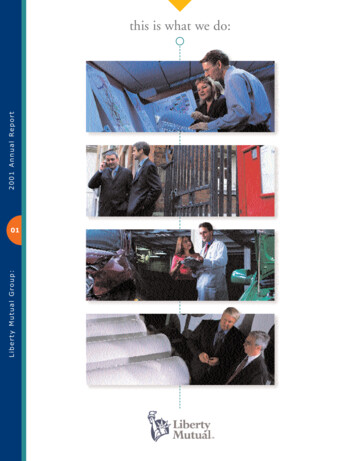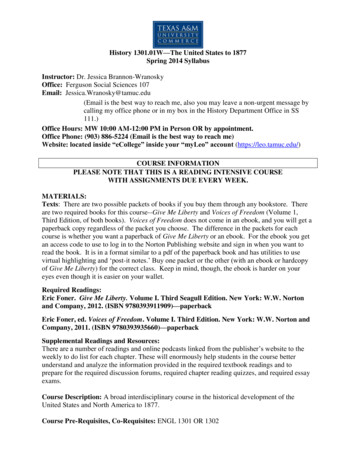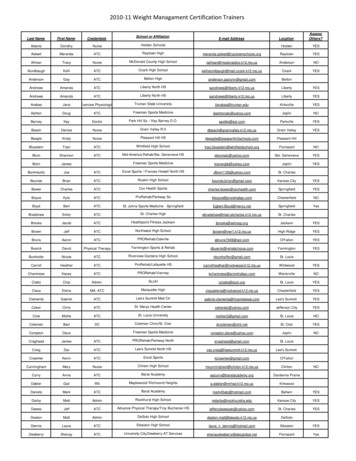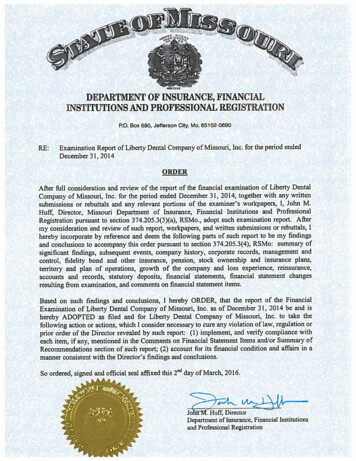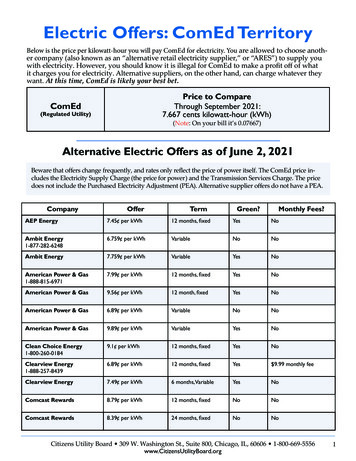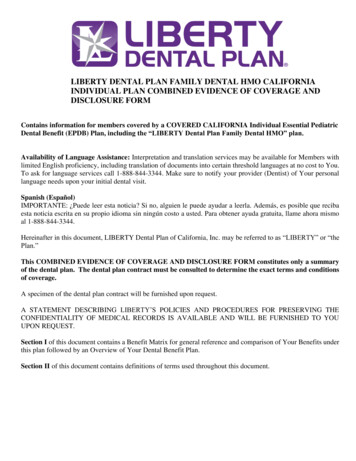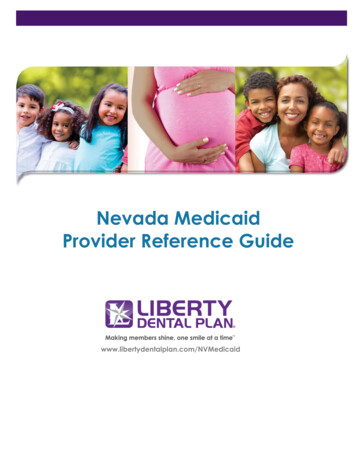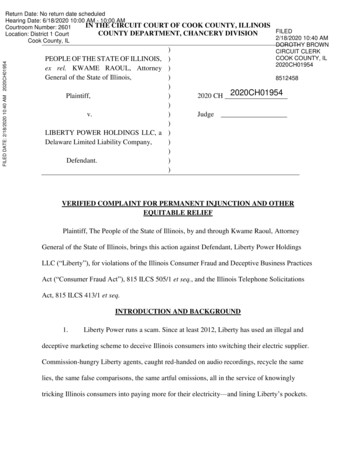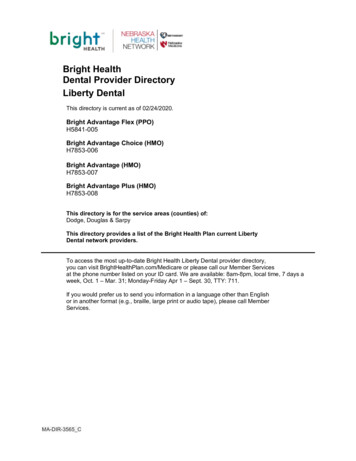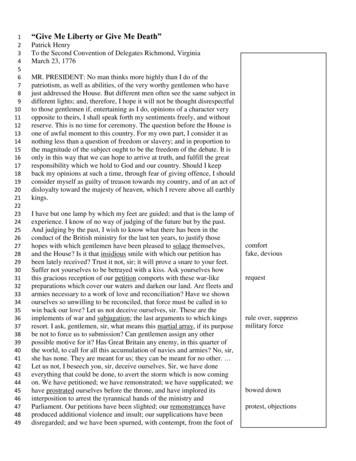
Transcription
031323334353637383940414243444546474849“Give Me Liberty or Give Me Death”Patrick HenryTo the Second Convention of Delegates Richmond, VirginiaMarch 23, 1776MR. PRESIDENT: No man thinks more highly than I do of thepatriotism, as well as abilities, of the very worthy gentlemen who havejust addressed the House. But different men often see the same subject indifferent lights; and, therefore, I hope it will not be thought disrespectfulto those gentlemen if, entertaining as I do, opinions of a character veryopposite to theirs, I shall speak forth my sentiments freely, and withoutreserve. This is no time for ceremony. The question before the House isone of awful moment to this country. For my own part, I consider it asnothing less than a question of freedom or slavery; and in proportion tothe magnitude of the subject ought to be the freedom of the debate. It isonly in this way that we can hope to arrive at truth, and fulfill the greatresponsibility which we hold to God and our country. Should I keepback my opinions at such a time, through fear of giving offence, I shouldconsider myself as guilty of treason towards my country, and of an act ofdisloyalty toward the majesty of heaven, which I revere above all earthlykings.I have but one lamp by which my feet are guided; and that is the lamp ofexperience. I know of no way of judging of the future but by the past.And judging by the past, I wish to know what there has been in theconduct of the British ministry for the last ten years, to justify thosehopes with which gentlemen have been pleased to solace themselves,and the House? Is it that insidious smile with which our petition hasbeen lately received? Trust it not, sir; it will prove a snare to your feet.Suffer not yourselves to be betrayed with a kiss. Ask yourselves howthis gracious reception of our petition comports with these war-likepreparations which cover our waters and darken our land. Are fleets andarmies necessary to a work of love and reconciliation? Have we shownourselves so unwilling to be reconciled, that force must be called in towin back our love? Let us not deceive ourselves, sir. These are theimplements of war and subjugation; the last arguments to which kingsresort. I ask, gentlemen, sir, what means this martial array, if its purposebe not to force us to submission? Can gentlemen assign any otherpossible motive for it? Has Great Britain any enemy, in this quarter ofthe world, to call for all this accumulation of navies and armies? No, sir,she has none. They are meant for us; they can be meant for no other. Let us not, I beseech you, sir, deceive ourselves. Sir, we have doneeverything that could be done, to avert the storm which is now comingon. We have petitioned; we have remonstrated; we have supplicated; wehave prostrated ourselves before the throne, and have implored itsinterposition to arrest the tyrannical hands of the ministry andParliament. Our petitions have been slighted; our remonstrances haveproduced additional violence and insult; our supplications have beendisregarded; and we have been spurned, with contempt, from the foot ofcomfortfake, deviousrequestrule over, suppressmilitary forcebowed downprotest, objections
e throne. In vain, after these things, may we indulge the fond hope ofpeace and reconciliation. There is no longer any room for hope. If wewish to be free if we mean to preserve inviolate those inestimableprivileges for which we have been so long contending if we mean notbasely to abandon the noble struggle in which we have been so longengaged, and which we have pledged ourselves never to abandon untilthe glorious object of our contest shall be obtained, we must fight! Irepeat it, sir, we must fight! An appeal to arms and to the God of Hosts isall that is left us!They tell us, sir, that we are weak; unable to cope with so formidable anadversary. But when shall we be stronger? Will it be the next week, orthe next year? Will it be when we are totally disarmed, and when aBritish guard shall be stationed in every house? Shall we gather strengthby irresolution and inaction? Shall we acquire the means of effectualresistance, by lying supinely on our backs, and hugging the delusivephantom of hope, until our enemies shall have bound us hand and foot?Sir, we are not weak if we make a proper use of those means which theGod of nature hath placed in our power. Three millions of people, armedin the holy cause of liberty, and in such a country as that which wepossess, are invincible by any force which our enemy can send againstus. Besides, sir, we shall not fight our battles alone. There is a just Godwho presides over the destinies of nations; and who will raise up friendsto fight our battles for us. The battle, sir, is not to the strong alone; it is tothe vigilant, the active, the brave. Besides, sir, we have no election. If wewere base enough to desire it, it is now too late to retire from the contest.There is no retreat but in submission and slavery! Our chains are forged!Their clanking may be heard on the plains of Boston! The war isinevitable and let it come! I repeat it, sir, let it come.It is in vain, sir, to extenuate the matter. Gentlemen may cry, Peace,Peace but there is no peace. The war is actually begun! The next gale thatsweeps from the north will bring to our ears the clash of resoundingarms! Our brethren are already in the field! Why stand we here idle?What is it that gentlemen wish? What would they have? Is life so dear, orpeace so sweet, as to be purchased at the price of chains and slavery?Forbid it, Almighty God! I know not what course others may take; but asfor me, give me liberty or give me death!flat, passivedownplay
Teacher GuideName of Text: “Give Me Liberty Or Give Me Death”Question Composers: Nicolle Morrison; Vallarie Larson; Judy SpencerStandards:Nevada State:H2.[6-8].13 Evaluate the influence of individuals in the building of a national identity.H3. [6-8].2 Explain the political and economic causes and effects of the American Revolution.H3. [6-8].3 Describe key political ideas that influenced the American Revolution and the formation of the United StatesCCSS: RH.6.8.1, .2, RH.6-8.4, .5 , .6, WHST.6-8.1Text Dependent QuestionsTeacher Notes and Possible Textual EvidenceFor Student AnswersWho is the author of this speech?2. Patrick HenryWho is this speech intended for? What word or words tell you that? Whoelse might the author be addressing?6. Mr. President of Second Convention of Delegates(Student misconception President of U.S.)3. Gentlemen, Second Convention of Delegates12. The House Delegates7-11. His adversaries in the HouseMany times during the speech Patrick Henry uses the pronouns “we”, “our”,and “us”. What can you infer from the use of these words?Patrick Henry is speaking for collective whole/all colonists, all DelegatesColonists, men and women, people at the convention, men already fightingfor liberty, people who value liberty.On line 12, Patrick Henry states, “This is no time for ceremony.” Whatevidence in the paragraph supports his tone?11. I shall speak forth my sentiments freely and without reserve17-20. Should I keep back my opinions at such a time, through fear of givingoffence, I should consider myself guilty of treason61. Will it be the next week, or the next year?77. The war is inevitable and let it come! I repeat it, sir, let it come!
Text Dependent QuestionsTeacher Notes and Possible Textual EvidenceFor Student Answers81. The war is actually begun!83. Our brethren are already in the field! Why stand we here idle?In line 52, Henry states that, “There is no longer any room for hope.” Thisstatement sets the tone for the entire second paragraph,How would you describe Patrick Henry’s tone in lines 23-58?What evidence is given to support his position?Confident, Convinced 23-24Rhetorical 28, 29, 32-33, 33-35,ForthrightBetrayed,Let downAngry, Frustrated,PassionateDeterminedStudent answers will vary. They should be able to support their descriptionswith evidence from the text.In the third paragraph, Henry uses sarcasm to contrast weakness andstrength. Cite several examples from the paragraph that show Henry’s use ofsarcasm.At several points in the text, Patrick Henry compares the condition of theAmerican Colonists to that of enslaved people. List several of thesecomparisons throughout the speech.61. But when shall we be stronger?62. Will it be when we are totally disarmed, and when a British guard shallbe stationed in every house?63-4. Shall we gather strength by irresolution and inaction?64. Shall we acquire by the means of effectual resistance, by lying supinely onour backs, and hugging the delusive phantom of op, until our enemies shallhave bound us hand and foot?14. A question of freedom or slavery15. The freedom of the debate51-6. If we wish to be free if we mean to preserve , we must fight!76. There is no retreat but in submission and slavery.76. Our chains are forged!77. Their clanking may be heard on the plains of Boston!84-85. Is life so dear, or peace so sweet, as to be purchased at the price ofchains and slavery?
Text Dependent QuestionsThroughout the speech, Patrick Henry uses religion and God as a primaryjustification and defense for war with Britain. Cite several examples from thetext identifying these reasons.Write a statement summarizing the significance of Henry’s faith for hisjustification of war.What is Patrick Henry’s purpose in giving this speech?Why is this speech entitled “Give me liberty or give me death?”Teacher Notes and Possible Textual EvidenceFor Student Answers16. Fulfill the great responsibility which we hold to God and our country.17-21. Should I keep back my opinions at such a time I should considermyself as guildy of treason towards my country, and of an act of disloyaltytoward the majesty of heaven, which I revere above all earthly kings.30. Suffer not yourselves to be betrayed with a kiss57. An appeal to arms and to the God of Hosts is all that is left us.67-8. We are not weak if we make proper use of those means which the Godof nature hath placed in our power.69. The holy cause of liberty71. We shall not fight our battles alone72. There There is a just God whoHe wants the colonists to go to war.Some evidence includes: Line 45-46 “ we must fight! I repeat it, sir, we mustfight!” Line 41 “There’s no longer any room for hope.” Line 34-35 “We’vedone everything that could be done.” Line 61 “ War is inevitable.” Line 64Our brethren are already in the field!”Patrick Henry would rather die than give up his freedom.Some evidence includes: Lines 15-16 “Consider myself guilty of treason actof disloyalty toward majesty of heaven.” Lines 59-60 “There is no retreat butin submission and slavery.”
Please compose a clear writing prompt or question to follow this close analytic reading. Make sure that your writing prompt/question follows the CCSSwriting standards (choose informational or argumentative) and that you use the terminology of the standards. The writing assignment can be a very formalessay or a fairly short piece, as long as it demonstrates that students have understood the document and can use evidence from it effectively.What are the reasons why Patrick Henry wants his colleagues in the Convention of Delegates to go to war with Britain? Begin with a claimUse and cite evidence from the passage.Be sure to include your reasoning.In the space below, create a very specific checklist that helps teachers what exactly to identify in order to measure student success or difficulty with thisparticular writing assignment on this particular reading. Make sure to use your grade level’s writing standards as a guide. Be clear! The claim should reflect that Patrick Henry is asking for war.Evidence should include phrases and words to support the claim. Line numbers should be included as citations. Evidence can be found throughoutthe document. Students should link the evidence back to the claim to show reasoning.
2. Patrick Henry 6. Mr. President of Second Convention of Delegates (Student misconception President of U.S.) 3. Gentlemen, Second Convention of Delegates 12. The House Delegates 7-11. His adversaries in the House Many times during the speech Patrick Henry uses the pronouns "we", "our", and "us".
